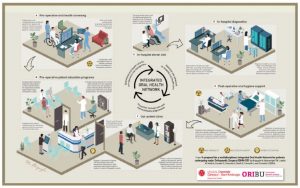Prof Tom Wainwright, ORI Visiting Fellow Dr Matteo Briguglio, and colleagues, have collaborated and published a new article in the journal Geriatrics, which is an aspirational “Proposal for a Multidisciplinary Integrated Oral Health Network for Patients Undergoing Major Orthopaedic Surgery”
In orthopaedic surgery, post-operative recovery can be complex, influenced by factors such as smoking, multi-morbidity, and malnutrition. This article seeks to recognise the interconnectedness of overall health and surgical outcomes, and promotes a novel proposal: the Integrated Oral Health Network applied to Orthopaedic Surgery (IOHN-OS), which aims to bridge the gap between dental health and orthopaedic care.

Healthcare network and stages to improve the quality of orthopaedic care with the integration of a dental team.
The article details the significance of the IOHN-OS proposal in integrating oral health with orthopaedic surgery care.
The Necessity of Oral Health Integration – The ageing process brings about significant changes in oral health, affecting dentition, chewing, and swallowing, alongside an increased risk of malnutrition. Hidden oral infections can lead to serious post-operative complications, such as peri-prosthetic joint infections. Moreover, oral health issues can impair nutritional intake essential for recovery, creating a vicious cycle detrimental to patient outcomes. These challenges underline the need for a comprehensive approach to patient care, integrating oral health into the peri-operative plan.
IOHN-OS: A Multidisciplinary Path to Care – The IOHN-OS proposes a peri-operative pathway, incorporating pre-operative oral health screenings, patient education, and in-hospital oral care, among others. This approach would not only address pre-operative vulnerabilities but also support post-surgery recovery through tailored educational programmes and follow-up care. The proposed network would foster collaboration among healthcare professionals, including dentists, dietitians, and physiotherapists, ensuring a holistic approach to patient well-being.
Challenges and Considerations – While the IOHN-OS presents a promising framework, its implementation is not without challenges. Key among these is the need for effective communication and coordination between the dental team, orthopaedic surgeons, and patients. The timing of dental interventions, accessibility to dental care, and the integration of educational initiatives for older patients also pose potential hurdles. Addressing these challenges will require adaptable strategies and collaborative efforts across healthcare disciplines.
A Step Towards Holistic Healthcare – Incorporating oral health into the care pathway for orthopaedic surgery patients represents a significant step towards a more holistic, patient-centred approach in healthcare. By addressing the multifaceted needs of the ageing population, particularly those undergoing major surgeries, the IOHN-OS model holds the potential to enhance surgical outcomes, improve patient quality of life, and reduce healthcare costs. As healthcare continues to evolve, such interdisciplinary initiatives will be crucial in meeting the complex demands of modern medicine.




